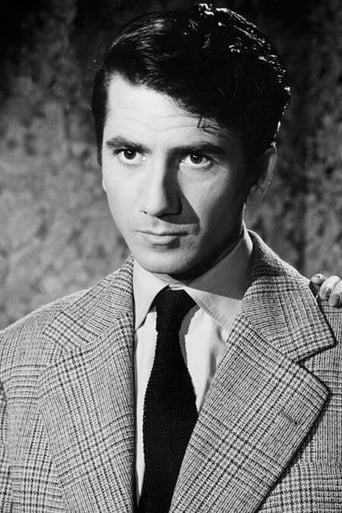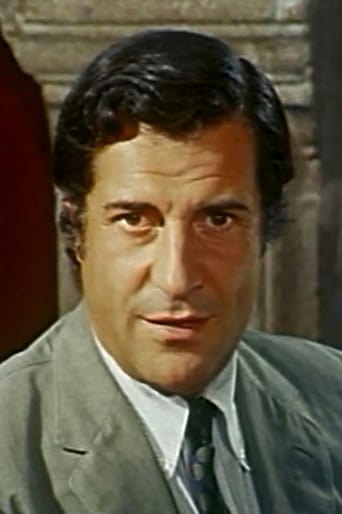markwood272
Gainsbourg and Birkin were actually quasi believable together, and the look of the film is 1000% late 60's "European" cinema. Nothing profound, but serviceable acting, decent production values, OK direction from Pierre Grimblat. Gainsbourg was not exactly a retiring sort of guy, to judge from the self-like character he plays in this film. His signature song of the era should have been titled "Je m'aime". Birkin had the ability to do ugly or beautiful, probably a source of her success as a model and sometime actress. I doubt that Birkin and Gainsbourg split up in the manner shown in the movie, but I don't know. "Slogan" is end of the decade mood music, which at the same time serves as a transition to the 70's. You can see where the look of things is headed in fashion, music, and popular culture generally from watching this movie, apparently a "lost film" for about 40 years.
lazarillo
I would say this tale of a May-December romance between a married frog-like advertisement producer/director (Serg Gainsbourg) and a naive but stunning British beauty (Jane Birkin) is pretty far-fetched,that is if life hadn't imitated art and the two actors hadn't become a real-life item. In fact, out of this unholy union was born the talented French actress Charlotte Gainsbourg--and one of the few actresses I find sexier than the younger Gainsbourg is her mother Jane Birkin, who I could quite happily watch clipping her toe-nails for 90 minutes.This isn't really much of a movie beyond the two leads. But Birkin does a lot more than clip her toe-nails--she gives a very good performance as a breath-takingly beautiful but mentally unstable young woman. And Gainsbourg, despite looking like "Mr. Bean", has genuine charisma, kind of like a Gallic version of Humphrey Bogart (and he sure sucks down the cigarettes like Bogie). It's also pretty neat the way the movie incorporates the Gainsboug character's goofy TV ads into the story of their relationship, thus giving a kind of pop-art sensibilty to the whole thing. Yes, the movie is a little fluffy and shallow. It's not exactly "La Dolce Vida", but it does have the typical 60's European sensibilty. It's not great, but worth seeing perhaps if you enjoy the films of that era.
lor_
I knew of this film's existence from the early '70s but never had a chance to see it until the inexplicable CULT EPICS DVD release. It was the penultimate film released by Columbia Pictures' art film subsidiary Royal Films Intl. subsidiary, a label that brought out many classic films including THE PUMPKIN EATER, REPULSION, CHINA IS NEAR, MASCULIN-FEMININ (and others by Godard), Visconti's SANDRA, the great black comedy NOTHING BUT THE BEST and Rosi's SALVATORE GIULIANO. The financial debacle at the end of the '60s caused the studios to retrench, and these art imports disappeared.I've also seen the final Royal 1970 release, SERAFINO, an unsung minor classic by the great Pietro Germi. It is instructive that Germi exploited the talent of performer Adriano Celentano in Serafino, keeping the singer under control in a dramatic role, but in Slogan we have director Pierre Grimblat apparently ceding control to multi-threat talent Serge Gainsbourg. The result is the apotheosis of '60s film-making: exactly what Frank Capra memorably complained about in his autobiography: he had retired from cinema after run-ins with star/producers Glenn Ford and Frank Sinatra late in his career. Capra was far more comfortable back in the Factory days, when he only had to worry about petty tyrants like Harry Cohn, and not the ego-tripping "lunatics who had taken over the asylum", to quote the oft-cited cliché about the decline of Hollywood.After sitting through Slogan over 40 years after it was made, I was struck by the indulgence here -the sheer contempt for the audience. Godard made the famous CONTEMPT, and he always struck me as the leader of the relatively new trend (in the '60s) of a filmmaker looking down on the viewer, frankly insulting those who had bought a ticket. This became more obvious in the pornography to come as cinema became liberalized, where downright insults levied at anyone stupid enough to "sit through this trash" became commonplace. The director is Pierre Grimblat, who has had a lengthy career as a producer, dabbling in directing from time to time. Key to understanding his point of view is his earlier Eddie Constantine vehicle THE EMPIRE OF NIGHT, which spoofs the tough guy genre of which Eddie was a typecast icon, better satirized in Godard's ALPHAVILLE 3 years later. The anything goes, goofy direction of SLOGAN was forecast there, even though Grimblat had directed a solid, well-worth reviving farce HOW NOT TO ROB A DEPARTMENT STORE in between the 2 pictures (I last saw that one in NYC some 25 years ago).Gainsbourg's character Fabergé, a TV advertisements director with dreams of making a feature film (sounds like Bob Giraldi, Michael Jackson's pilot in BEAT IT) is one of the most insufferable blokes ever to lead a movie cast. He is sullen and nasty to women throughout, misogynist with a capital M. From a dramatic or structural point-of-view, his exaggerated behavior is so reprehensible it seems to be a satire, but is played straight and very difficult to watch. Everyone commenting on this film seems to give kudos to its capturing his real-life romance with British starlet Jane Birkin; all I can say is yawn -we've seen many movies, notably the Taylor/Burton string, where off-screen shenanigans are paramount, and it is strictly a cop-out to focus on these digressions when evaluating the film's actual content. How do distractions become a plus -what alchemy of criticism is at work here?The technical incompetence of Grimblat is glaring -many, many porno films of this same era, made on no budgets as one-day-wonders, have better post-synching of sound; in some scenes the viewer can actually visualize some poor devil in a studio clacking sea shells together or some other lame device dating back to radio in the '20s, to crudely fill up some time on the soundtrack. Birkin's dialog delivery is particularly annoying -especially in comparison with dozens of excellent performances she subsequently gave, culminating in Rivette's masterpiece La Belle Noiseuse.I'm assuming Grimblat shot the film silently, in the tradition of Italian and Eastern European cinema, because we are meant to hear the music of Gainsbourg and little else. I'm not a fan of his work, and in cinematic terms at best he reminds me occasionally of Claude Bolling (see: BORSALINO, made a year later). Obviously, it helps to be a Gainsbourg fan (read: fanatic) to sit through this -all others, beware.Ultimately SLOGAN is about its ostensible satire of advertising, laid on with a trowel, and the dated '60s concentration on surface glamor. Our stars cavort in pop art interiors (often embarrassingly as in Birkin's big Isadora Duncan scene dancing around as she opens closets) or are subjects of travelogue shots in fancy sports cars and wandering around the seamier neighborhoods of always-photogenic Venice. It was Swinging London that epitomized this approach to film back then, but Grimblat's visual pollution is even harder to watch.With literally hundreds of classic French films of the '60s that have been completely forgotten in America (I will suggest for starters SUNDAYS AND CYBELE, THE WANDERER by Albicocco and Jessua's LIFE UPSIDE DOWN), why should a misfire like SLOGAN be exhumed instead? I blame this on a major inversion in film appreciation and scholarship, dating back to the pernicious Medveds (Golden Turkey Awards) and now spearheaded by Tarantino. It's always about money, and crap with sensationalistic content (D'Amato, Franco, Sarno, Tinto, etc.), preferably sex and/or horror, is flooding the marketplace at the expense of quality cinema. That's what the ignorant and impressionable fans gravitate toward, especially when self-educated experts like Quentin give it the stamp of approval. Put simply, SLOGAN has a hook -it's marketable.
Spencer Hawkins
Jane Birkin is English and mispronounces all of her r's in this movie. Still, her French is infinitely easier to understand than Serge's mumbling. They are cute together, although the plot of a doomed affair feels trite. The magic and music make the movie. Serge can make people and things vanish by snapping his fingers. This is analogous to the way he speeds up life and creates unbelievable situations in his commercials, like a man seducing a strange woman in a train-car by showing off his aftershave. This looks like it may have inspired Axe deodorant, which also has an off-the-wall French ad campaign.The music is various clips of an instrumental version of the brilliant "Chanson de Slogan." He mixes this with a drumbeat, which eventually alternates phrases with the other song toward the denouement. Like in Je t'aime, moi non plus, the music stands out so much that I would have liked to have been enveloped in a larger number of melodies. These were enchanting though.





